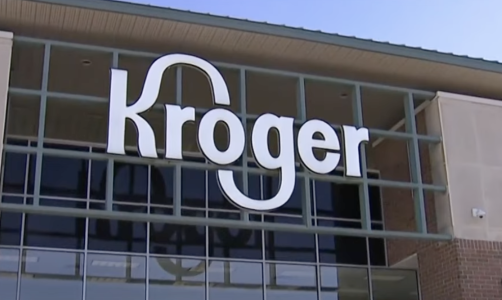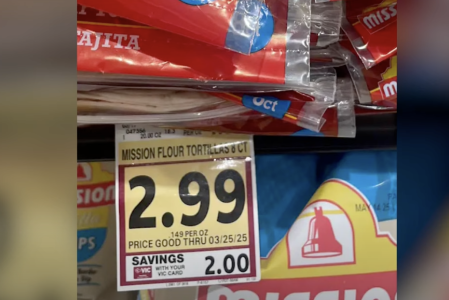Are you paying more than you should? Infuriating investigation reveals America’s #2 grocer is overcharging shoppers with fake sale prices!
- Replies 1
If you’ve ever left the grocery store feeling like your receipt was a little longer—and pricier—than expected, you’re not alone.
A bombshell investigation has just revealed that Kroger, the nation’s second-largest grocery chain, has been overcharging customers by advertising expired sale prices on store shelves, only to ring up full prices at checkout.
For millions of Americans, especially those on fixed incomes, this sneaky practice could be quietly draining your wallet every week.
The Secret Shopper Scandal: What Was Uncovered
A joint probe by The Guardian US and Consumer Reports sent “secret shoppers” into 14 Kroger stores across 14 states and Washington, DC.
Their mission? To see if the price you see is really the price you pay. The results were eye-opening: more than 150 items were found with outdated sale tags—some as much as two weeks old—leading to an average markup of 18%.
In some cases, the price jump was a staggering 60%!
Imagine picking up a jar of minced garlic labeled $2.49, only to be charged $3.99 at the register. Or grabbing a personal pizza on “sale” for $1, but paying $1.25 instead.

These aren’t isolated incidents. The investigation suggests that thousands of shoppers could be paying more than they bargained for, week after week.
Who This Hurts Most: Seniors and Shoppers on Fixed Incomes
For many in The GrayVine community, every dollar counts.
As Joy Alexander, a Kroger worker from Denver, told investigators, “It really makes me feel bad because some of them are on fixed incomes and they’re older. They’re not going to pay attention. They think that when they took it off the shelf, it was $2.50. They don’t know that they’re paying $3.75 for that one item.”
With food prices up 24% since 2020 (according to the USDA), and new tariffs threatening to push costs even higher, these “phantom discounts” are more than just an annoyance—they’re a real threat to your budget.
Also read: Kroger faces major “checkout issues”, sparking outrage and loyalty concerns
How Does This Happen? The Fine Print and Fuzzy Dates
The investigation found that expired sale tags often don’t clearly state when a discount has ended.
Sometimes, the expiration date is hidden in tiny print or disguised in corporate code.
While some eagle-eyed shoppers catch the discrepancy at checkout, many—especially those juggling a long list or wrangling grandkids—don’t notice until it’s too late.
Kroger’s Response
Kroger, which operates more than 2,700 stores nationwide, has pushed back against the allegations.

In a statement, a company spokesperson called the findings “misinformation,” claiming they represent only “a handful of discrete issues from billions of daily transactions.” They also said that, “It in no way reflects the seriousness with which we take our transparent and affordable pricing.”
But for shoppers who’ve been overcharged, that’s cold comfort. And this isn’t the first time Kroger’s pricing practices have come under fire.

Last year, US Senators Elizabeth Warren and Bob Casey launched an investigation into the company’s use of electronic price tags, worried they could be used to quietly raise prices in real time.
Kroger’s attempt to buy Albertsons was blocked after the Federal Trade Commission sued, arguing the merger would reduce competition and push prices higher for shoppers.
Also read: Cybersecurity concern at Kroger? Shoppers in uproar over alleged new policy—here’s what you need to know
In court, Kroger acknowledged that it had increased the prices of staple goods by more than necessary to match inflation.
Last August, the grocer’s chief pricing officer told a judge that the company had marked up milk and eggs beyond what cost pressures alone would justify.
“On milk and eggs, retail inflation has been significantly higher than cost inflation,” Andy Groff wrote in a March email to senior management, which was submitted as evidence.
The retailer also grabbed headlines in March when former CEO Rodney McMullen unexpectedly stepped down amid questions over “personal conduct.”
Source: KTLA 5 / Youtube.
Executives declined to elaborate, only saying the issue was “unrelated to the business” and “inconsistent with Kroger’s policy on business ethics.”
Following McMullen’s exit, lead director Ronald Sargeant was named interim CEO.
The frustration is real. One Ohio customer wrote to the state’s attorney general, “We just spent $121 for two seniors for a week’s groceries. We were overcharged $8.07 on a frozen turkey. We shop there regularly and three out of five times we have to correct them on prices.”
What Can You Do? Protect Yourself at the Checkout
Here at The GrayVine, we believe knowledge is power. Here are some practical steps you can take to avoid being overcharged:
1. Double-Check Prices at Checkout: Watch the register as your items are scanned. If something rings up higher than the shelf price, speak up immediately.
2. Take Photos of Sale Tags: If you spot a great deal, snap a quick photo of the price tag (including the date, if possible) on your phone. This gives you proof if there’s a discrepancy at checkout.
3. Review Your Receipt Before Leaving: Don’t wait until you get home. Scan your receipt for any unexpected price jumps while you’re still in the store.
4. Report Issues to Store Management: If you notice a pattern of expired sale tags or frequent overcharges, let the store manager know. Most stores have a policy to honor the posted price.
5. Contact Your State Attorney General: If you feel you’re being systematically overcharged, file a complaint. Consumer protection agencies take these issues seriously.
Read next: The secret competitor aiming to dethrone Trader Joe’s—Plans for MAJOR expansion unveiled!

Have you ever caught a price at the register that didn’t match the shelf? Do you have tips for fellow readers on how to avoid being overcharged? We want to hear from you! Share your experiences and advice in the comments below!
A bombshell investigation has just revealed that Kroger, the nation’s second-largest grocery chain, has been overcharging customers by advertising expired sale prices on store shelves, only to ring up full prices at checkout.
For millions of Americans, especially those on fixed incomes, this sneaky practice could be quietly draining your wallet every week.
The Secret Shopper Scandal: What Was Uncovered
A joint probe by The Guardian US and Consumer Reports sent “secret shoppers” into 14 Kroger stores across 14 states and Washington, DC.
Their mission? To see if the price you see is really the price you pay. The results were eye-opening: more than 150 items were found with outdated sale tags—some as much as two weeks old—leading to an average markup of 18%.
In some cases, the price jump was a staggering 60%!
Imagine picking up a jar of minced garlic labeled $2.49, only to be charged $3.99 at the register. Or grabbing a personal pizza on “sale” for $1, but paying $1.25 instead.

Kroger, America's second largest grocery chain, has been accused of overcharging customers by displaying expired sale prices on shelves that no longer apply at checkout. Image source: KTLA 5 / Unsplash.
These aren’t isolated incidents. The investigation suggests that thousands of shoppers could be paying more than they bargained for, week after week.
Who This Hurts Most: Seniors and Shoppers on Fixed Incomes
For many in The GrayVine community, every dollar counts.
As Joy Alexander, a Kroger worker from Denver, told investigators, “It really makes me feel bad because some of them are on fixed incomes and they’re older. They’re not going to pay attention. They think that when they took it off the shelf, it was $2.50. They don’t know that they’re paying $3.75 for that one item.”
With food prices up 24% since 2020 (according to the USDA), and new tariffs threatening to push costs even higher, these “phantom discounts” are more than just an annoyance—they’re a real threat to your budget.
Also read: Kroger faces major “checkout issues”, sparking outrage and loyalty concerns
How Does This Happen? The Fine Print and Fuzzy Dates
The investigation found that expired sale tags often don’t clearly state when a discount has ended.
Sometimes, the expiration date is hidden in tiny print or disguised in corporate code.
While some eagle-eyed shoppers catch the discrepancy at checkout, many—especially those juggling a long list or wrangling grandkids—don’t notice until it’s too late.
Kroger’s Response
Kroger, which operates more than 2,700 stores nationwide, has pushed back against the allegations.

An investigation found over 150 items labelled with outdated discounts in at least 14 stores across 14 states and Washington DC, resulting in an average markup of 18% and, in some cases, up to 60%. Image source: KTLA 5 / Unsplash.
In a statement, a company spokesperson called the findings “misinformation,” claiming they represent only “a handful of discrete issues from billions of daily transactions.” They also said that, “It in no way reflects the seriousness with which we take our transparent and affordable pricing.”
But for shoppers who’ve been overcharged, that’s cold comfort. And this isn’t the first time Kroger’s pricing practices have come under fire.

Many customers—particularly older and vulnerable people—were unaware they were paying higher prices due to small print or unclear expiry dates on sales tags. Source: Consumer Reports.
Last year, US Senators Elizabeth Warren and Bob Casey launched an investigation into the company’s use of electronic price tags, worried they could be used to quietly raise prices in real time.
Kroger’s attempt to buy Albertsons was blocked after the Federal Trade Commission sued, arguing the merger would reduce competition and push prices higher for shoppers.
Also read: Cybersecurity concern at Kroger? Shoppers in uproar over alleged new policy—here’s what you need to know
In court, Kroger acknowledged that it had increased the prices of staple goods by more than necessary to match inflation.
Last August, the grocer’s chief pricing officer told a judge that the company had marked up milk and eggs beyond what cost pressures alone would justify.
“On milk and eggs, retail inflation has been significantly higher than cost inflation,” Andy Groff wrote in a March email to senior management, which was submitted as evidence.
The retailer also grabbed headlines in March when former CEO Rodney McMullen unexpectedly stepped down amid questions over “personal conduct.”
Source: KTLA 5 / Youtube.
Executives declined to elaborate, only saying the issue was “unrelated to the business” and “inconsistent with Kroger’s policy on business ethics.”
Following McMullen’s exit, lead director Ronald Sargeant was named interim CEO.
The frustration is real. One Ohio customer wrote to the state’s attorney general, “We just spent $121 for two seniors for a week’s groceries. We were overcharged $8.07 on a frozen turkey. We shop there regularly and three out of five times we have to correct them on prices.”
What Can You Do? Protect Yourself at the Checkout
Here at The GrayVine, we believe knowledge is power. Here are some practical steps you can take to avoid being overcharged:
1. Double-Check Prices at Checkout: Watch the register as your items are scanned. If something rings up higher than the shelf price, speak up immediately.
2. Take Photos of Sale Tags: If you spot a great deal, snap a quick photo of the price tag (including the date, if possible) on your phone. This gives you proof if there’s a discrepancy at checkout.
3. Review Your Receipt Before Leaving: Don’t wait until you get home. Scan your receipt for any unexpected price jumps while you’re still in the store.
4. Report Issues to Store Management: If you notice a pattern of expired sale tags or frequent overcharges, let the store manager know. Most stores have a policy to honor the posted price.
5. Contact Your State Attorney General: If you feel you’re being systematically overcharged, file a complaint. Consumer protection agencies take these issues seriously.
Read next: The secret competitor aiming to dethrone Trader Joe’s—Plans for MAJOR expansion unveiled!
Key Takeaways
- Kroger, America's second largest grocery chain, has been accused of overcharging customers by displaying expired sale prices on shelves that no longer apply at checkout.
- An investigation found over 150 items labelled with outdated discounts in at least 14 stores across 14 states and Washington DC, resulting in an average markup of 18% and, in some cases, up to 60%.
- Many customers—particularly older and vulnerable people—were unaware they were paying higher prices due to small print or unclear expiry dates on sales tags.
- Kroger has denied the allegations, stating the investigation only covers isolated incidents, but admitted in court last year to increasing the retail prices of milk and eggs beyond the rate of inflation, raising further concerns about its pricing practices.
Have you ever caught a price at the register that didn’t match the shelf? Do you have tips for fellow readers on how to avoid being overcharged? We want to hear from you! Share your experiences and advice in the comments below!
Last edited:






